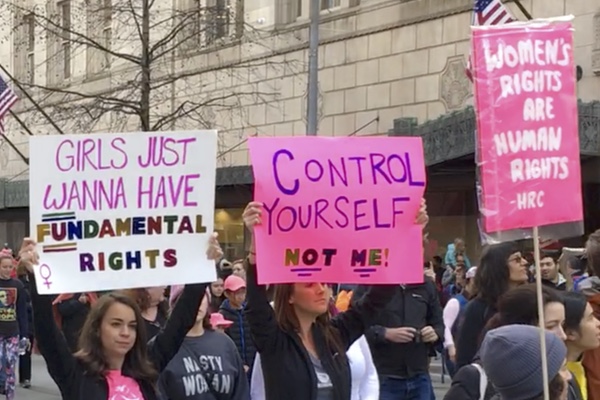How Come Wall Street Hasn’t Been Caught Up in the #MeToo Movement?

To
date, the #MeToo Movement has yet to topple a single major U.S.
banker. While it is likely that some will be accused of workplace
sexual harassment eventually, the financial industry is not likely to
see anything like the tidal wave of revelations currently striking
the entertainment and media industries. Why not? Been there, done
that.
High
finance was long a bastion of misogyny so virulent that it had its
#MeToo moment two decades ago, when #s were still just nerdy keypad
oddities sometimes called the number sign. “Golden handcuffs” in
the form of pay far higher than most could earn elsewhere (though far
less than their male colleagues) induced many women on Wall Street to
endure behaviors that would make Harvey Weinstein blush. Eventually,
though, no amount of money proved sufficient to buy their continued
silence.
“At
Smith Barney,” Frank Partnoy noted in F.I.A.S.C.O.,
his 1997 exposé of Wall Street investment banks and brokerages,
“women were called lapdogs, bitches, and whores. Male brokers
groped women, demanded sex, and gave women genital-shaped food. At
Merrill Lynch, women were humiliated by strippers at office parties.
… At Lew Lieberbaum, there were strippers, cat calls, and demands
for oral sex.” When a female employee complained, a male manager,
in view of the whole staff, whipped “it” out and told her to keep
her mouth open.
According to Susan Antilla, author of Tales from the Boom-Boom Room: The Landmark Legal Battles that Exposed Wall Street’s Shocking Culture of Sexual Harassment (2002), one third of the women at Smith Barney had been sexually coerced on the job. The same percentage had been called one or more sexual slurs by a colleague and two in five had been forced to view pornographic images in the office. Almost one in ten physically or verbally fought off unwanted sexual advances at work. Women who complained were fired on the grounds that they could not get along with their male coworkers!
One
notorious Smith Barney branch in Long Island was run by a
quintessential “good old boy” named Nick Cuneo, who believed that
a woman’s place was in her home or in his bed. He was beloved by
the male brokers he helped to enrich over the years but female
employees were outraged, as were the male employees Cuneo called
“faggots” or wimps. It was Cuneo’s idea to build a party room,
christened the Boom-Boom Room, in the basement of the branch in 1982.
For over a decade, it was debauchery headquarters.
When
female employees complained about the Boom-Boom Room, Smith Barney’s
head of human resources, Jodie Beth-Galos, advised them to get along
with Nick, who was valued as a major rainmaker. (Meanwhile, at
broker-dealer Rodman & Renshaw, male employees regularly
propositioned Susan Jaskowski, the company’s head
of human resources!)
The
women decided to sue when Smith Barney attorneys told them that they
sounded “hysterical” and should just quit. By October 1996, 23
women in 10 states had joined their class action suit (needed to
circumvent arbitration, which was mandatory for workers in the
securities industry at that time) and other women instituted suit
against Merrill Lynch, then the nation’s largest brokerage and
another pit of iniquity.
The
negative media attention and settlement costs, which totaled over
$100 million, induced Smith Barney, Merrill, Morgan Stanley, and
other big Wall Street firms to implement sexual harassment training
and reform outdated human resources policies and procedures.
According to sociologist Louise Marie Roth in her 2006 book, Selling
Women Short: Gender Inequality on Wall Street,
“you would be hard-pressed to find a ‘boom-boom room’
associated with any of the major or minor firms” on Wall Street.
What
has been going on behind Wall Street’s closed doors, however, is
anyone’s guess. What is clear is that top bankers remain
prodigiously well paid, so they have a lot to lose. But, like the
entertainment and media stars being outed by #MeToo, they are already
so wealthy that losing their reputations and future income may not be
important enough to them to induce acceptable behavior. They
certainly can afford to pay some hush money, but that isn’t always
enough.
In short, some tycoons might be concerned that past, private indiscretions might be about to bite them, but stockholders in the companies run by those “masters of the universe” need not fret much because they have long since paid for the open sexual harassment once so prevalent on Wall Street.